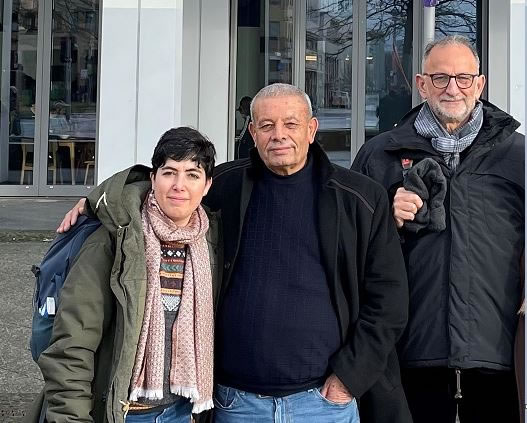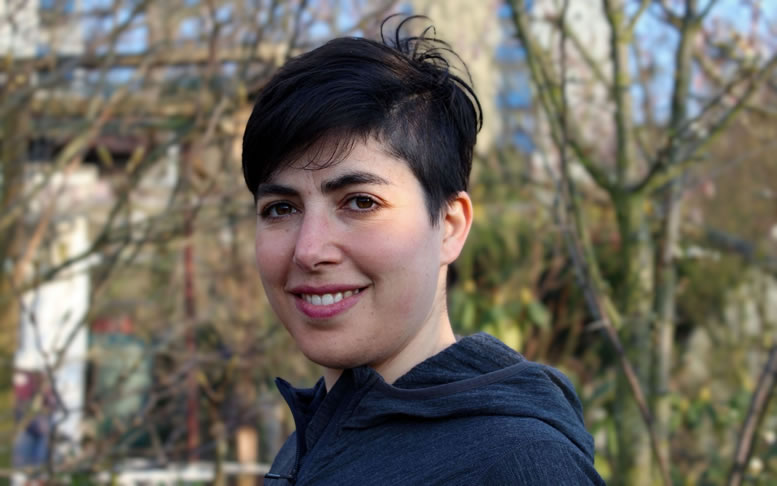Without Palestinian freedom, there can be no Israeli security
Interview with Israeli Peace Activist Vered Berman
“Peace isn’t made with your best friend it’s made with your so-called enemies”
Vered Berman grew up in West Jerusalem, has lived in Berlin for 22 years, and has been committed to peace since her youth. In 2003, she lost her mother in a Hamas suicide bombing. Twenty years later, she wrote a letter to the attacker’s family. In this interview with Kontrast, she shares what moved her to do so and why dialogue between Israelis and Palestinians is so important. Although the situation for peace activism has deteriorated significantly in recent years, she remains convinced that a peaceful resolution between Israel and Palestine will come—because, historically, that has always been the case, she says.
“Every war eventually ends. And it ends because politicians with blood on their hands, for whatever reason or pressure, sign some kind of agreement.”
Together with bereaved Palestinian and Israeli families, she works through the organization Parents Circle – Families Forum.
Kontrast: You’ve been active in the Israeli-Palestinian peace organization Parents Circle – Families Forum (PCFF) since 2023. What is the goal of this organization?
Vered Berman: The organization consists exclusively of people from Israel and Palestine who have lost someone to the conflict. In my case, it’s my mother, who died in a Hamas suicide attack in 2003. Everyone in the organization has this terrible “ticket of entry”—as we lovingly call it.
This organization has been around for 30 years. In 1994, a 19-year-old Israeli soldier named Arik Frankental was hitchhiking home when he was kidnapped and murdered by Hamas. His father then teamed up with other Israeli parents—hence the name Parents Circle, because in the beginning, it really was just parents.
In 1998, they made first contact with parents in Gaza who had also lost children in the conflict.
Initially, it was about dialogue, getting to know each other, understanding that grief and pain—while unique—are also universally human. But soon, it also became political: working to end the occupation and to achieve peace.
That includes Gaza, the West Bank, East Jerusalem, and Palestinian citizens within Israel. All forms of discrimination must end. Everyone must be able to live freely and safely. Without Palestinian freedom, there can be no Israeli security. And without Israeli security, no Palestinian freedom.
These things go hand in hand. I want to be clear: this is not to justify violence. It’s about facing reality.
We don’t dictate what peace should look like. We don’t say it has to be a two-state solution, a one-state solution, or a federation. Our focus is to stop the bloodshed, to come to the table, and to advocate for justice and peace for all people living between the Jordan River and the Mediterranean Sea.
What that ultimately looks like is not our primary concern.
Kontrast: So what is your primary concern?
Vered Berman: We have two main activities. First, we organize dialogue sessions in Israeli high schools. Two members—one Palestinian and one Israeli—speak with students in their final years of school, who are soon to become soldiers. Many of them only know a very dehumanizing narrative about “the other side.”
But when someone shares a personal story of loss and explains why they are committed to peace, it has an impact. It helps these young people to see the Palestinians in front of them as human beings.
This was successful for many years—until 2023. That’s when Israel’s Minister of Education, Yoav Kisch, banned the sessions. We challenged the ban in court and initially won, but then the laws were changed, and we’ve been stuck in ongoing legal battles ever since.
Second, we hold memorial ceremonies together with Combatants for Peace—a group of former Israeli and Palestinian fighters who laid down their arms. For 20 years now, we’ve held a joint ceremony on Israel’s Memorial Day for fallen soldiers and victims of terrorism. But unlike the official event, we commemorate all victims—because there are victims on both sides. In 2023, 18,000 people attended. But it’s become increasingly dangerous to speak publicly for peace. Right-wing extremists and police repression have intensified massively. In the last two years, the ceremony had to be held in secret locations and broadcast online only. Even so, this year one of the broadcast venues—a Reform synagogue in Ra’anana—was attacked, and three people were hospitalized.
Kontrast: How does the Israeli side justify banning your school programs?
Vered Berman: The main accusation is that we equate terror victims with terrorists. This is because—we say it openly—anyone who has lost someone and believes in peace and dialogue is welcome to join us. I don’t personally know any relatives of attackers, but they’re not excluded. If the brother of the man who murdered my mother were to say, “I lost my brother and believe in peace,” he could join us.
Peace isn’t made with your best friend. It’s made with so-called enemies. That’s why this principle is so important to us. That’s also why I wrote a letter to the attacker’s family.
Kontrast: May I ask what you wrote to them?
Vered Berman: I was 19, working as an au pair in Berlin, when I got the call that my mother was dead. She had just turned 50 and was perfectly healthy. She was murdered in a suicide bombing during the Second Intifada. I spent years processing that trauma and never thought about the attacker. Only 20 years later, after October 7, 2023—which deeply retraumatized me—did I start to explore his story, his family, and his humanity. I read every article I could find.
What must he have believed to kiss his mother goodbye that morning, go to Jerusalem, and kill 17 people?
I’ve lived in Germany—the perpetrator country—for 20 years now. My grandparents were the only survivors of their families. The family I’ve built here is half-German (non-Jewish). My partner’s family were Nazi bystanders. Humanity takes on a new meaning. Not everything is black and white.
In my letter to his mother, I wrote about this humanity, my hope, and my experience with PCFF. That I’ve met Palestinians who’ve lost children or parents too—and that it’s clear we are all human. The soldiers now committing war crimes in Gaza are human. The terrorists who committed war crimes on October 7 are human too. All of them are people with hopes, with love—people who have to believe the other side isn’t human, otherwise I can’t explain how such things are possible. I wrote that I hope my grandchildren can love his grandnieces and nephews—as he didn’t have children—just like I love my partner. I ended the letter with: “I am sorry for your loss.”
In March, I found out his mother had died just a few months earlier—before the letter arrived. That hit me unexpectedly. I didn’t expect to feel that. Was it grief? And if so, why was I grieving a woman who raised my mother’s killer? I think it was grief over a missed opportunity. I’ve since gotten the attacker’s brother’s phone number. I’m not sure what to do with it yet, but I want to make sure that letter gets to someone. Though I don’t know what to expect—whether he’s open to dialogue or not.
Kontrast: How have your encounters with bereaved Palestinians been?
Vered Berman: Above all, painful. Every story is tragic and horrifying. At one of my first PCFF meetings, Laila Alsheikh shared how her 6-month-old baby inhaled tear gas during street protests. They were held at checkpoints for so many hours that they couldn’t get to the hospital in time. The baby died—needlessly. It’s all so senseless. So avoidable. That’s why I do this. It’s not naive hope that peace will come if we just sing Kumbaya. It’s a knowledge—looking at history, every violent regime falls eventually.
Every war ends. Because at some point, politicians with blood on their hands—under whatever pressure—sign an agreement. Then suddenly soldiers stop killing each other. Children stop dying. I know that day will come. Until then, every death is absolutely pointless. Israel is no safer because that baby died. And Palestine is no freer because my mother died.
I hope that if we raise our voices loud enough, this senseless pain can end sooner, and others won’t have to go through it.
The Parents Circle Association
The Parents Circle – Families Forum (PCFF)—now also known as Israeli Palestinian Bereaved Families for Peace—brings together Israeli and Palestinian families who have lost loved ones in the conflict. Together, they aim to prevent further deaths and foster dialogue, reconciliation, and peace. The organization has existed since 1995 and now includes around 800 families. In 2025, PCFF received the Shenhav-Shahrabani Prize awarded by two Israeli institutes.
Vered Berman (41) grew up in West Jerusalem and has lived in Berlin for 22 years. She is a social worker, social scientist, children’s book author, and lecturer at the Alice Salomon University. In 2003, Berman lost her mother in a Hamas suicide bombing. Since 2023, she has been a member of the Parents Circle – Families Forum (PCFF). A year later, she co-founded Parents Circle – Friends Deutschland in Berlin.
Author Lena Kraniz Original source Kontrast
TheBetter.news. https://thebetter.news/israeli-peace-activist-interview/ The rights to the content remain with the original publisher.
Vered Berman, Wajih Tmaiza, and Yuval Rahamim (from left to right) at a PCFF meeting in January 2025 in Berlin. Wajih is a Palestinian from Idna (near Hebron). His 13-year-old brother was shot and killed by the Israeli army in 1990; eleven years later, three of his cousins—two adults and an infant—were murdered in settler violence. He joined PCFF afterward. Yuval lost his father in the Six-Day War when he was only eight years old. (Credit: Berman)



Sites linking to this page have chosen to adopt this Privacy Policy as their own. This means: they agree to abide by the principles laid out below.
In common with other websites, log files are stored on the web server saving details such as the visitor's IP address, browser type, referring page and time of visit.
Cookies may be used to remember visitor preferences when interacting with the website. Where registration is required, the visitor's email and a username will be stored on the server.
The information is used to enhance the visitor's experience when using the website to display personalised content and possibly advertising.
Email addresses will not be sold, rented or leased to 3rd parties. Email may be sent to inform you of news of our services or offers by us or our affiliates.
If you have subscribed to one of our services, you may unsubscribe by following the instructions which were included in the email that you received.
You can block cookies via your browser settings but this may prevent you from accessing certain features of the website.
Cookies are small digital signature files that are stored by your web browser that allow your preferences to be recorded when visiting the website. Cookies are used by most websites to record visitor preferences. Also they may be used to track your return visits to the website.
Like all sites, we use 3rd party tools to help us run the website. They are used not to track you but to track info like the visitors numbers on the site over a given period, to allow you to interact with the social-media widget and to allow us to login into this web based CMS (Content Management System).